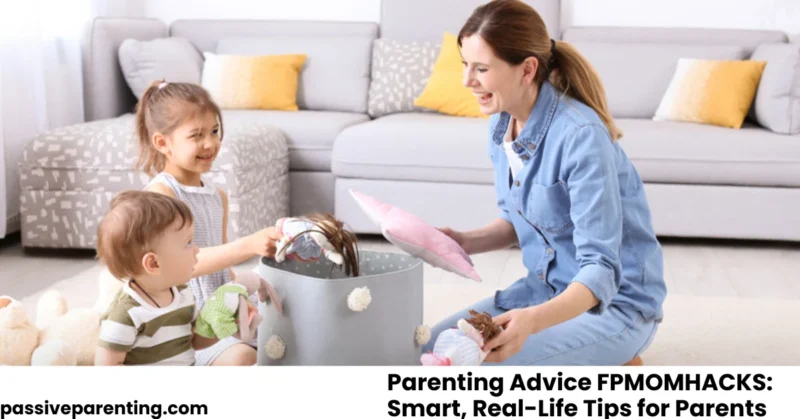Introduction
Parenting is a lifelong journey filled with love, challenges, and constant learning. Every day brings new opportunities to connect, teach, and grow with your child. But between busy schedules and daily stress, it can be hard to stay calm and positive. That’s where FPMomHacks—a set of simple yet powerful parenting strategies—come in. These tips focus on emotional connection, practical routines, and mindful communication.
Instead of chasing perfection, these hacks help parents focus on what truly matters: connection, empathy, and balance. From handling tantrums to encouraging independence, each idea is designed for real families and real challenges. In this article, you’ll discover proven FPMomHacks that simplify parenting, strengthen relationships, and bring joy back into family life. Let’s explore how you can use these simple tricks to create a happier, calmer, and more loving home environment for both you and your children.
What Are FPMomHacks?
FPMomHacks are practical parenting techniques created to make family life smoother and more connected. They are based on the idea that small daily changes can make a big difference in your child’s emotional growth and your overall peace of mind.
These hacks are not about strict rules or perfection—they’re about flexibility and awareness. The goal is to help parents create healthy emotional connections while maintaining structure and respect. FPMomHacks combine gentle parenting, emotional intelligence, and modern family management skills to make parenting easier and more effective.
At their core, these hacks remind us that children need understanding more than control, presence more than pressure, and love more than lectures.
7 Proven FPMomHacks for Better Parenting
Below are seven powerful FPMomHacks that can help you build stronger bonds and reduce daily stress.
1. Offer Choices, Not Commands
Instead of saying, “Put on your shoes right now,” try, “Do you want to wear your red shoes or blue ones?” This gives children a sense of control and reduces resistance. By offering limited options, you guide them while still respecting their independence. This simple shift in language can turn daily power struggles into moments of cooperation.
2. Handle Tantrums with Calm and Connection
When your child is having a meltdown, avoid yelling or punishment. Instead, kneel down, make eye contact, and say something like, “I can see you’re upset. Let’s take deep breaths together.” This teaches emotional regulation through modeling calm behavior. The goal isn’t to stop the crying instantly—it’s to help your child feel seen, safe, and supported.
3. Create a Snack Drawer for Independenc
Encourage independence by setting up a low shelf or drawer filled with healthy snacks like fruit cups, crackers, or water bottles. When kids can make small choices like these, it builds confidence and reduces the constant, “Mom, I’m hungry!” interruptions. It also teaches responsibility and helps them learn about healthy eating habits early on.
4. Use One-Sentence Bedtime Stories
Parents are often exhausted at the end of the day. Instead of skipping bedtime stories, make them fun and short. Try a “one-sentence story game.” You start with a line like, “Once upon a time, a cat wanted to fly.” Then your child adds the next sentence. It becomes a creative bonding activity that keeps bedtime light, joyful, and connected.
5. Replace Praise with Noticing
Instead of constantly saying, “Good job!”—which can become meaningless—try to describe what you notice. For example, say, “You worked hard on that puzzle; it looked tricky!” or “I see you used a lot of bright colors in your drawing.” This builds self-awareness, encourages effort, and helps children value progress rather than just outcomes.
6. Plan Screen-Free Family Rituals
Rather than banning screens completely, create fun family rituals that naturally replace screen time. You can plan “tech-free” evenings for cooking together, storytelling, or outdoor walks. When you make these moments consistent, children learn to enjoy quality time without feeling like something is being taken away.
7. Use Reassuring Phrases During Stress
When your child feels scared or upset, avoid saying, “Don’t worry” or “You’re fine.” Instead, say, “You’re safe. I’m here. I’ll stay with you.” These simple words build emotional security and teach empathy. Over time, children learn to use the same calm reassurance for themselves when they face challenges.
Supporting Habits That Make FPMomHacks Work
FPMomHacks work best when combined with daily habits that promote consistency and emotional awareness. Here are five habits that support these parenting strategies:
A. Build Gentle Routines
Children feel safest when their days are predictable. Create routines for morning, meals, and bedtime that are calm and consistent. Routines reduce anxiety, prevent conflicts, and help kids understand expectations without constant reminders.
B. Practice Emotion Coaching
When your child is upset, listen first and label the feeling: “You seem frustrated because your toy broke.” This helps them identify emotions and learn that it’s okay to express them. Over time, emotion coaching builds emotional intelligence and empathy.
C. Delegate Without Guilt
Parenting isn’t about doing everything alone. Share responsibilities with your partner, relatives, or friends. Delegate small tasks like grocery runs or laundry to free up emotional energy for your children. It’s better to be emotionally available than constantly exhausted.
D. Use Micro-Moments of Connection
Connection doesn’t always need long conversations. A quick hug, a smile, or saying “I’m proud of you” during a busy day can keep the emotional bond strong. These “micro-moments” matter more than occasional big gestures.
E. Embrace Imperfection
No parent is perfect—and that’s okay. Mistakes are part of growth. When you lose your temper or make a wrong decision, apologize and move forward. Modeling forgiveness and humility teaches children valuable lessons about relationships and resilience.
The Psychology Behind FPMomHacks
FPMomHacks aren’t just cute tricks—they’re backed by child development psychology. Modern research shows that positive communication, emotional validation, and routine-building significantly improve children’s mental and emotional health.
- Offering choices supports autonomy and cooperation.
- Emotion validation helps children feel secure and heard.
- Consistent routines lower anxiety and improve focus.
- Repairing relationships after mistakes strengthens long-term trust.
These hacks align with proven parenting methods that balance warmth with structure. They empower children to express feelings safely and teach parents to stay emotionally connected, even under stress.
How to Apply FPMomHacks in Real Life
Implementing these strategies doesn’t mean changing your entire lifestyle overnight. Start small and stay consistent.
- Choose two hacks to start with—like “offering choices” and “emotion coaching.”
- Communicate with your partner or caregiver so everyone uses similar language with your child.
- Observe results—notice how your child reacts and how your own stress level changes.
- Adjust as needed—each child is different, so adapt hacks to fit your family.
- Celebrate progress—every calmer bedtime or peaceful morning is a success worth recognizing.
Consistency and flexibility are key. The goal is not perfection, but progress.
Common Mistakes to Avoid
Even great parents sometimes make errors when trying new techniques. Watch out for these common pitfalls:
- Expecting instant results. It takes time for new habits to show changes.
- Being inconsistent. If you offer choices one day and commands the next, kids get confused.
- Overexplaining. Too much talking can overwhelm a child during emotional moments.
- Using hacks as manipulation. The aim is connection, not control.
- Forgetting self-care. You can’t parent calmly if you’re emotionally drained.
Remember: patience, presence, and compassion work far better than perfectionism.
Long-Term Benefits of FPMomHacks
Over time, applying FPMomHacks creates lasting positive effects for the entire family:
- Better emotional control in children
- Stronger parent-child communication
- Reduced household stress and conflict
- Improved cooperation and independence
- Healthier self-esteem and trust
Most importantly, these hacks help parents rediscover the joy of parenting—a sense of teamwork, laughter, and peace that grows stronger with time.
Conclusion
Parenting doesn’t have to feel overwhelming. By using simple yet meaningful FPMomHacks, you can transform everyday challenges into opportunities for connection and growth. Each small change—whether offering choices, staying calm during tantrums, or noticing effort—builds a stronger emotional foundation for your child.
These hacks encourage presence, empathy, and real communication instead of stress and guilt. Over time, you’ll notice more cooperation, fewer conflicts, and a warmer family atmosphere. Remember, good parenting isn’t about being perfect—it’s about being present, patient, and willing to grow.
Start with one or two FPMomHacks today and watch how they change the tone of your home. Parenting becomes easier, lighter, and filled with the joy of genuine connection. With love, patience, and small consistent steps, every parent can create a happy, balanced, and peaceful home.
FAQs
1. How to introduce FPMomHacks to my child?
Start with small steps. Offer choices during routine tasks and explain calmly. When your child sees that their opinion matters, they’ll respond more positively.
2. How to handle tantrums using FPMomHacks?
Stay calm and validate feelings. Say things like, “I know you’re upset.” Guide your child to take deep breaths or hug it out. Avoid punishment; focus on connection.
3. How to make time for these hacks in a busy schedule?
Use short rituals—morning hugs, bedtime chats, or meal-time jokes. Even small, consistent efforts can create big emotional impact.
4. How to get my partner to use these parenting tips too?
Share examples of how these hacks reduce stress and improve family peace. Practice them together so consistency stays strong across both parents.
5. How to adapt FPMomHacks for older children?
For teens, focus on respect and open communication. Give them more control in decision-making and discuss emotions without judgment.









